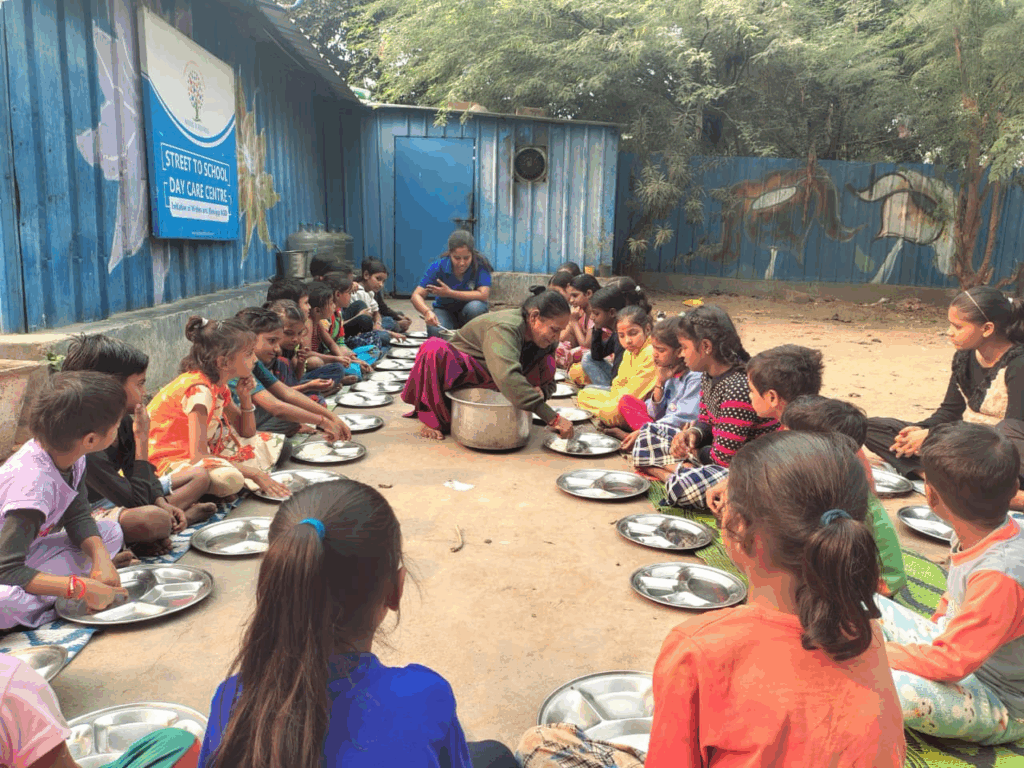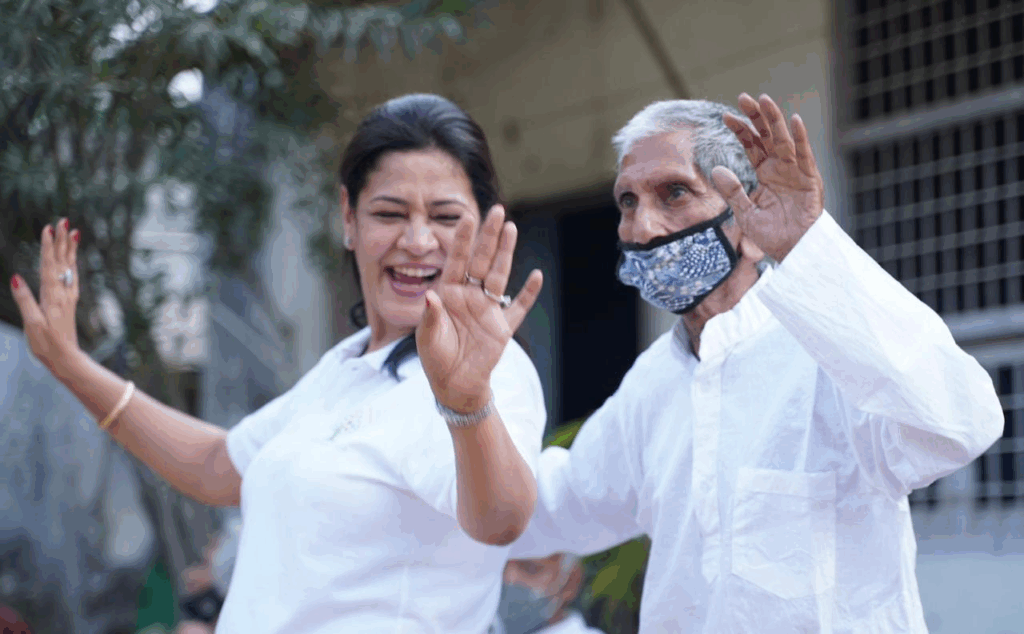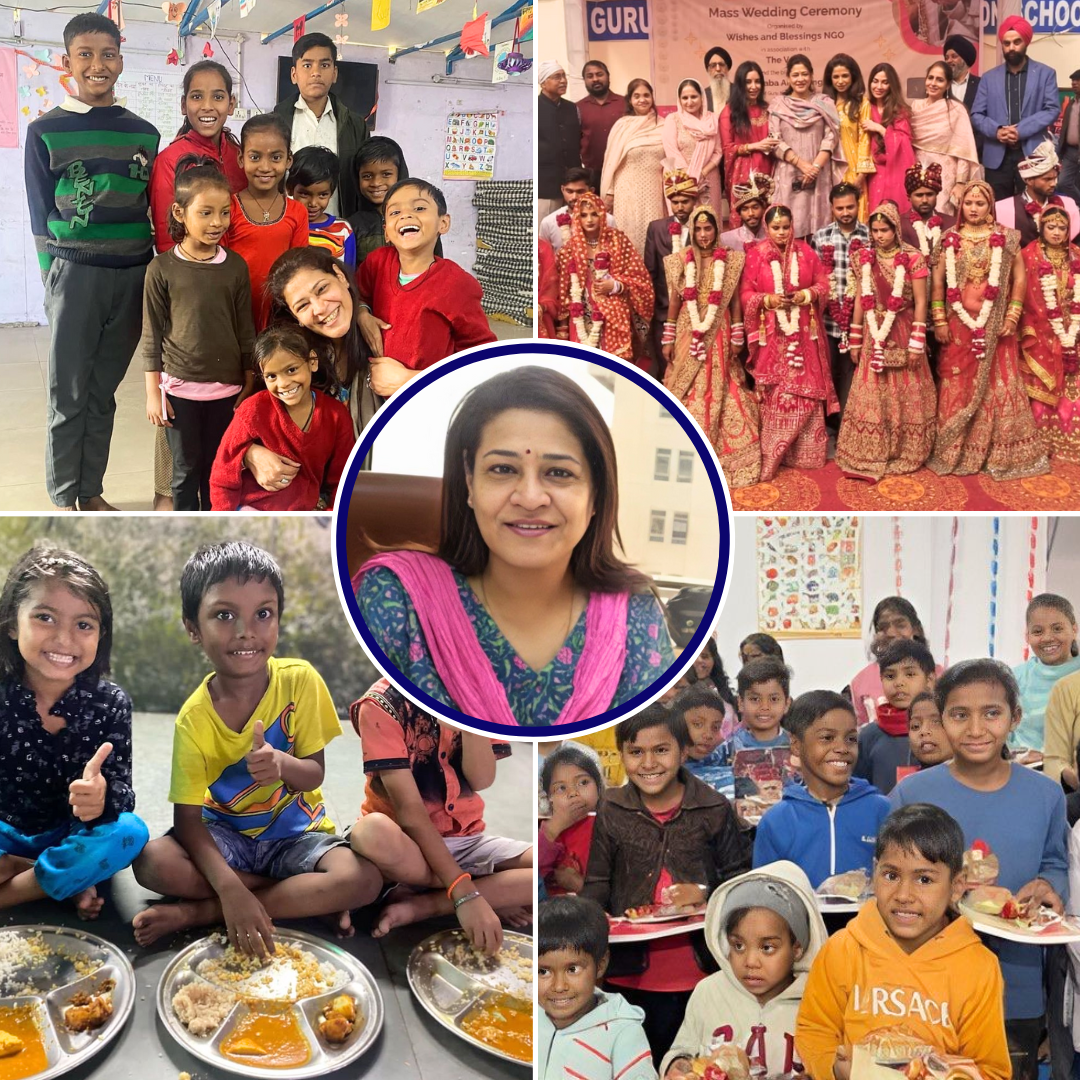Wishes and Blessings was founded in 2014, rooted deeply in a combination of personal values, life experiences, and pivotal moments that shaped its founder’s Dr Geetanjali Chopra’s commitment to social service.
Raised in a Punjabi family where generosity and responsibility toward others were intrinsic, the foundation of empathy was laid early. Education further nurtured these qualities, broadening awareness of wider societal challenges beyond personal spheres.
The catalyst for the NGO’s creation was a defining, life-altering experience in March 2014. When a group of visually impaired children invited the founder to celebrate Holi the festival of colors with them, hesitation first arose due to uncertainty about how such a festival could engage children who could not see colors.
Yet, witnessing their pure joy as they experienced colors through touch, sound, and laughter profoundly moved the founder. This moment revealed stark gaps in society: between those who need aid and those willing to help but uncertain how to do so effectively.

Inspired by this transformative event, Wishes and Blessings was established with the mission to bridge these gaps by connecting donors with underprivileged beneficiaries. The organization’s name itself reflects this philosophy fulfilling wishes leads to blessings passed back to society.
Beginning with visually impaired children, it has expanded to include orphanages, elderly homes, and shelters, transcending social, economic, and gender barriers. This foundation highlights a uniquely human-centered approach, bridging empathy with action in India’s complex social fabric.

While talking to The Logical Indian, Dr. Geetanjali stated, “the core mission of Wishes and Blessings is grounded in the belief that every person deserves the chance to dream and live with dignity.” The NGO envisions a world where the label “underprivileged” fades into obsolescence because opportunities for education, health, nutrition, and happiness become universal.
To realize this vision, Wishes and Blessings runs multiple interconnected programmes addressing seven critical intervention areas including education, nutrition, elderly care, skill development, and disaster relief. Each initiative is given equal importance rather than competing for priority, ensuring comprehensive community support.
Key programs include:
- Education: Sponsoring childhood education, setting up street to school day care centers for street and slum children, running open paathshaalas to empower marginalized children.
- Nutrition: Providing fresh, hygienic and nutritious cooked food to 2000 people everyday through it’s Daily Meals programme and operating two community kitchens that provide affordable, hygienic meals daily to vulnerable populations
- Elderly Care: Running Mann Ka Tilak old age homes in Delhi and Vrindavan offering free accommodation, nutritious meals, medical support, and social engagement opportunities for abused and abandoned elderlies. The NGO also supports multiple old age homes across states like Tamil Nadu, Maharashtra, West Bengal, and Jharkhand.
- Skill Development: Offering vocational training aimed at empowering especially women economically and socially.
- Relief Efforts: Timely response to natural and man-made disasters with immediate and long-term aid.
The NGO’s multifaceted approach exemplifies a holistic model suited to India’s diverse, layered social challenges. By providing dignity-focused aid that empowers rather than merely supports, Wishes and Blessings facilitates transformative, sustainable impact that aligns closely with India’s broader development goals for inclusive growth.

Accountability, Transparency, and Impact
A critical pillar of Wishes and Blessings is its steadfast commitment to accountability, transparency, and ethical conduct. Recognizing the prevalent trust deficit in the Indian nonprofit sector with beneficiaries wary due to historical neglect and donors cautious from past disappointments the NGO prioritizes building and maintaining trust through consistency and openness.
Mechanisms include:
- Personal involvement of leadership and team members on the ground.
- Regular monitoring, surprise visits, and strict reporting protocols.
- Transparent sharing of impact data with donors and partners.
- Qualitative feedback from beneficiaries combined with quantitative indicators such as meals served, school enrollments, and skill certifications.
- Periodic evaluations to refine programs and ensure ongoing relevance and quality.
This layered evaluation ensures that every initiative is closely aligned with defined objectives while being sensitive to human stories behind the data.
This blend of numbers and narratives reinforces the NGO’s credibility among stakeholders, fostering a culture of learning and accountability that can serve as a blueprint for Indian NGOs operating in challenging multi-cause environments.

Challenges and Learnings from Vulnerable Communities
Running a multi-cause NGO in India presents formidable challenges. Funds must be balanced equitably across competing priorities without compromising quality. It requires constant effort to overcome the trust deficit, recruit and retain skilled, emotionally resilient staff, and navigate often complex government and CSR regulations.

From direct engagement with vulnerable groups, Wishes and Blessings has internalized key lessons:
- Empathetic listening is fundamental to building trust and understanding real needs.
- Dignity is transformative; small gestures of respect can have profound impacts on beneficiaries’ self-worth.
- Partnerships with communities as equal collaborators, not mere recipients, lead to deeper, sustainable change.
- Social change is incremental, requiring persistence, consistency, and genuine presence “showing up” even when situations are difficult.
These insights reflect broader social realities in India where social services must be culturally sensitive, locally embedded, and flexible enough to adapt to diverse challenges while aspiring to systemic change.

Commenting on her journey as the founder of Wishes and Blessings, Dr Chopra states, “ It has been nothing short of magical. It has been a profound roller coaster marked by moments of joy and heartbreak, successes and setbacks, constant learning and quiet resilience. Yet, through every twist and turn, the greatest fulfilment has come from witnessing tears turn into smiles and despair blossom into hope. These transformations have been my biggest reward. When I look back, I am humbled by how far we have come from a simple conviction to a growing movement, touching thousands of lives each day. And while the distance travelled is meaningful, the path ahead is even longer, calling for deeper commitment and greater compassion. None of this would have been possible without the countless people who have stood by us. My heartfelt gratitude to everyone who has supported, volunteered, worked with us, and blessed us along the way.”

The Logical Indian’s Perspective
Wishes and Blessings exemplifies key themes in modern Indian philanthropy: leveraging personal storytelling and lived experience to inspire collective action; bridging gaps between desire to give and effective channels for impact; and embracing multi-sectoral engagement that includes grassroots interaction, structured transparency, and corporate-social partnerships.
India’s social sector landscape is marked by tremendous diversity and complexity, with historical legacies of community-based giving evolving into organized philanthropy addressing systemic inequalities. NGOs like Wishes and Blessings stand out by integrating traditional values of empathy and generosity with modern governance and impact measurement frameworks, which are increasingly expected by donors and government alike.
The NGO’s focus on multi-cause programming resonates well with India’s overlapping social challenges where poverty, education deficits, health gaps, and elder care needs coexist and require integrated solutions. Their emphasis on preserving dignity and fostering empowerment counters prevalent charity fatigue and paternalism, aligning with India’s growing discourse on rights-based development.
If you’d like us to feature your story, please write to us at csr@5w1h.media











